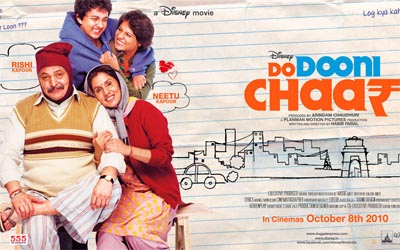Habib Faizal 's Directorial Debut Not Under Yashraj Banner!
 It seems strange that the director of this week’s much-acclaimed film Do Dooni Chaar chose to make his directorial debut away from his home-ground the Yashraj banner. The Do Dooni Chaar director Habib Faizal, who has written a number of films for Yashraj Films and proclaims great proximity to Aditya Chopra, strangely chose to make his directorial debut with another producer (Planman Films).
It seems strange that the director of this week’s much-acclaimed film Do Dooni Chaar chose to make his directorial debut away from his home-ground the Yashraj banner. The Do Dooni Chaar director Habib Faizal, who has written a number of films for Yashraj Films and proclaims great proximity to Aditya Chopra, strangely chose to make his directorial debut with another producer (Planman Films).
When questioned about it, the soft-spoken product of Delhi’s Jamia Millia university argues, “I could’ve easily made my first film with Adi. He’s so close to me that he has guided me through every stop of Do Dooni Chaar. Not just Adi but also his dad, Mr. Yash Chopra. When Yashji saw my film he said, ‘You’ve made a very real very interesting film.’ Coming from someone whose films like Dharmputra, Waqt, Kala Patthar and Deewaar moulded my interest in cinema, that compliment meant the world to me. So yes, I could have any time made a film for that banner.”
So what made Habib, who had written a number of Yashraj Films including Siddharth Anand’s Ta Ra Rum Pum & Salaam Namaste and Shaad Ali’s Jhoom Baraabar Jhoom turn to another producer for his directorial debut?
Says Habib, who has also served as a television journalist (for NDTV) before turning to scriptwriting, “At the time when I thought I was ready to direct my first film Adi was completely consumed by his own film Rab Ne Bana Di Jodi. There was no way I could slip my own film into the banner. Like I said, I can go back and direct another film for YashRaj any time I want. In fact I’ve also written Yashraj’s Band Baja Baraat which is currently being directed by my friend Maneesh Sharma.”
But here’s the thing. Aditya Chopra was directing a film that went into the same mind space and cultural specificity as Habib Faizal. Both Rab Ne Bana Di Jodi and Do Dooni Chaar were set in a Punjabi milieu. The protagonist was a working class Punjabi on a scooter and with a moustache.
No wonder Habib had to quietly take his creativity elsewhere. He fondly recalls how easily Rishi Kapoor and Neetu Singh blended into the locations in Delhi where they shot. “Rishi Kapoor ceased to be the iconic star in Delhi. He became so much part of the Delhi-Punjabi milieu that soon plate-loads of delicious food started reaching our location from all the neighbours. That was a good thing. Because I had made it very clear to Rishiji that he was not supposed to lose even an ounce of his bulk. My protagonist Santosh Duggal had to be roly-poly.”
The character of the underpaid teacher is based on Habib’s own teacher Kewal Arora. Says Habib, “I’d often wonder why our academicians are so underpaid. We live in an acquisitive world. In every city of India kids look out of their home windows at big cars parked outside wondering when they can get one of those. I chose Delhi because it’s a milieu I know well. But the me-too syndrome exists everywhere.”
Habib credits a lot of the film’s efficacy to his lead. “Once I had Rishiji and Neetuji playing my protagonists I had nothing to worry about. In Do Dooni Chaar I wanted to bring forward the plight of our teachers. But not at the cost of the entertainment value. First and foremost I wanted audiences to like my film.”
Habib has no intention of doing purposely issue-based films. “I don’t even know when I will direct my next film. The urge has to come to me. Not that I can afford to chill while the inspiration to direct hits me. I’ve a 14-year-old daughter whose future I have to secure. I do know whatever I direct next will again be rooted to the working class and its desires and longings. But I am certainly not going to bring up the plight of a specific group of professionals in our country in every film I direct. Do Dooni Chaar was about teachers being underpaid. My next film won’t be about the life of doctors, or engineers or call-centre workers. I don’t want to become the Arthur Hailey of film making.”